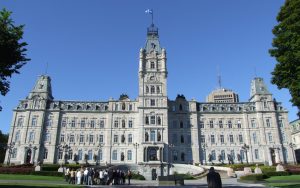
The provincial government of Quebec will forge ahead with its controversial plan to block unlicensed online poker and gambling sites, despite protests that the move would be impractical and potentially illegal.
“We will follow-up on the measures announced in the budget,” said the finance minister’s press attaché, Andrée-Lyne Hallé told CJAD radio this week.
It’s a stance that contradicts the advice of a working group, headed by University of Montreal professor Louise Nadeau, commissioned by the government to inform its policy on online gaming.
“We know very, very well we have several child pornography sites, and even then we are not blocking them out. It’s extremely difficult, and it’s easier said than done,” said, Nadeau, who cites Italy as an example of a state that has attempted to do the same, but found the process fraught with difficulty.
She also believes that the policy would struggle to survive a legal challenge.
Blacklist
Quebec will demand that internet service providers restrict access to online poker and gambling sites in order to protect the revenues of its province-run Loto-Quebec corporation.
The plans for an “illegal website filtering measure” were drawn up in Quebec’s March budget, and the government believes the scheme will boost Loto-Quebec’s revenues by $13.5 million in 2016-2017 and $27 million in subsequent years.
Under the plans, the corporation, which operates online poker and casino under the Espace-jeux brand, would be required to compile a blacklist that ISPs would then be forced to block.
Quebec did not say whether PokerStars, whose parent, Amaya Inc, is headquartered in Montreal and provides technology for Espace-jeux, would be included on the blacklist.
University of Ottawa internet law professor Michael Greist has also criticized the proposals.
He says they will probably be challenged because telecommunications regulations are usually the domain of federal government. And while gambling on illegal websites may be illegal, viewing those websites isn’t.
“Open Internet at Risk”
“To legislate blocking for commercial gain sets a dangerous Canadian precedent,” he wrote on his blog. “Once blocking gaming and gambling sites is established, it is easy to envision the government requiring blocking of sites that are alleged to infringe copyright or blocking e-commerce sites that are not bilingual or do not pay provincial taxes.
“The open Internet in Canada would be placed at risk of unprecedented government intervention into how Internet providers manage their networks and what sites Canadians are able to access,” he added.
Nadeau says the potential legal battles involved would quickly become protracted and too expensive for the government. “I would suspect that the constitutional lawyers would have a nice battle and would probably end up paying a lot of income tax,” she quipped.


